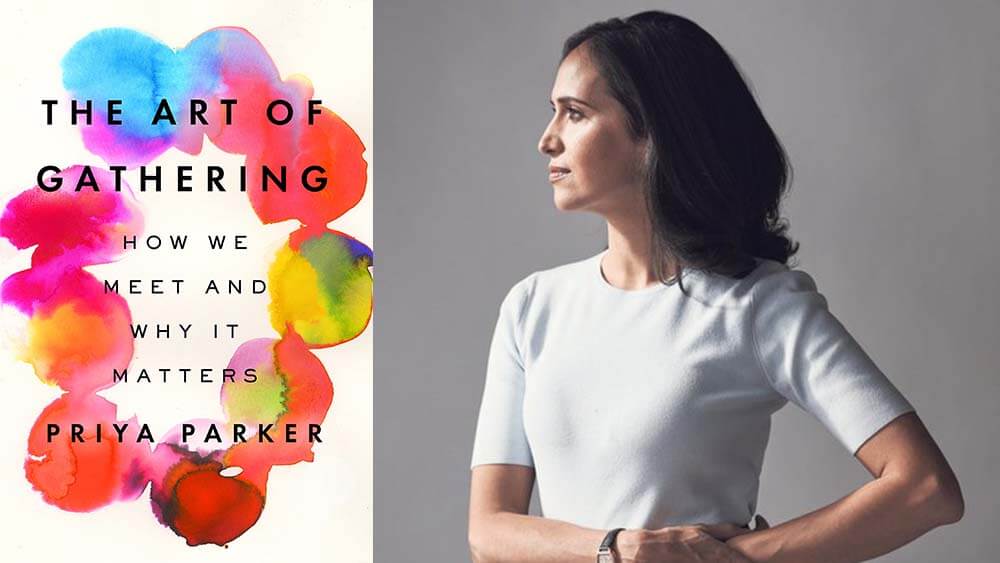
Priya Parker, author of The Art of Gathering, will give the opening keynote address at PCMA EduCon 2023, which takes place June 25-28 in Montréal. (Jeff Allen photo)
When a book publicist’s Twitter account tipped me off in 2018 to the fact that a conflict negotiator and facilitator named Priya Parker was launching her new book, The Art of Gathering: How We Meet and Why It Matters, at a New York City bookstore, it seemed more than likely that her work would resonate with Convene’s readers, so I went to the launch.
Still, I wasn’t prepared for how deeply thoughtful Parker was about what it means when people gather or how thoroughly she would deconstruct everything about it. She didn’t read from her book that evening, but instead put her ideas into practice, by engaging the audience, and answering — but also asking — questions, inviting us to share our own stories. We connected not just with Parker’s ideas, but with each other.
Since then, Parker has become a leading thinker, writer, and speaker on gatherings, exploring — throughout the months and years of the pandemic —what it means to meet with purpose online and what could change when we would get to meet again in person. Parker hosted a New York Times podcast, “Together Apart,” and spoke on stages including the TED conference and at SXSW. On June 26, Parker will be the opening keynote speaker at PCMA EduCon in Montreal.
Here at Convene, we’ve kept up with her, too — we interviewed Parker in Brooklyn, where she lives, not long after her book was published, as well as by email. Here’s a short list of some of her quotes that have stayed with us:
On what gatherings are — and what they are not
When the focus of gathering is about the “stuff” of the event “we inadvertently shrink a human challenge down to a logistical one. Gathering is a form of leadership — it’s not a form of logistics. And part of this is changing the culture in our companies and in our workplaces that move our assumptions from our gatherings being centered around things to remembering that gathering is actually a form of group leadership around people.”
Read: “Priya Parker: Don’t Skip Over Purpose”
On the importance of openings and closings
“The biggest mistake we make every day as individual gatherers is that we assume that the purpose of the gathering is obvious and shared. [Both in person and online,] the first 5 percent of a meeting really matters, because it creates a sense of safety for participants, a sense of, ‘What are we doing here? Why are we here? How can I engage?’ And how we close — the last 5 percent of a meeting — really matters. We open a world and we need to take time to close that world. It’s not rocket science. It can simply be asking: ‘What transpired here? What did we learn?’”
Read: “How to Open and Close a Meeting.”
On why it’s a mistake to begin with formats
“I think different conferences and different gathering formats have given us, at their best, a demonstration of how to do something well. The problem is when people think, ‘Okay, I’m going to replicate TED.’ We keep making the mistake of replicating formats. First ask what the purpose is and then find your format.”
On the power of choosing the right setting
“Embodiment to me, means creating, in both psychological and physical ways, an experience that represents the ideas that you’re trying to help people explore. It’s not that I’m anti-food. It’s not that I’m anti-décor — I like a beautiful place as much as the next person. But everything that you create in an environment should serve the purpose of the gathering. And the parts of a room setup that I am interested in are: How do you physically set up space so that the room is working for your goals?”
On why she asks the same questions in designing social events and business events
“Human dynamics and group dynamics are the same everywhere. Size changes what happens in a room and context deeply matters, but the same skills and lens that I use to think about what goes into creating a meaningful, connection-filled block party are the same questions that I ask to think about how do you create a meaningful, connection-filled World Economic Forum. They end up looking radically different. But the set of questions is the same.”
On the thread that runs through every experience
“In every context, I help people solve problems through a group experience. That’s the core common thread. What I care about in any group experience I’m a part of, in addition to solving the problem, is that I’m also helping build a temporary community and a sense of belonging to that larger purpose with the people who happen to be in the room.”
On the opportunity presented by the pandemic
“We are in a collective moment where we each have the opportunity to really make over, one specific gathering at a time, how we want to intentionally convene — and who with.”
Read: “Reinventing the Rules for Gathering”
Barbara Palmer is deputy editor of Convene.
Register Today
You still can register for PCMA EduCon 2023, taking place June 25-28 at the Fairmont The Queen Elizabeth, in Montréal, Québec, Canada.
